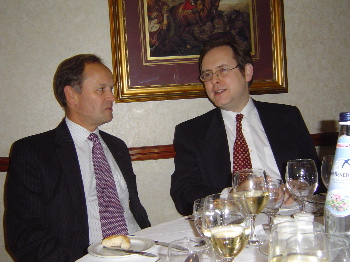We are developing the social individualist meta-context for the future. From the very serious to the extremely frivolous... lets see what is on the mind of the Samizdata people.
Samizdata, derived from Samizdat /n. - a system of clandestine publication of banned literature in the USSR [Russ.,= self-publishing house]
|
With all the understandable attention being focused on the dreadful situation in the lands skirting the Indian Ocean, there is always a danger that disasters of a different, more Man-made kind, get overlooked. Well this week the German statistics office reported a dreadful set of unemployment figures, showing the number of jobless in Europe’s biggest economy to be at the highest level for seven years
A Bloomberg report on the story contains the following passage:
New measures cutting benefits for the long-term unemployed took effect on Jan. 1. Those without a job, including people previously registered as social-welfare recipients rather than as jobless, will also face increased pressure to accept job offers or risk losing benefits. The changes will add an as yet undetermined number of people to the January jobless total.
But it is clear that the German authorities are still tinkering with the issue. That 10.8 percent of the working age population of such an important country should be out of a job is a disgrace. What I find odd though is how little outraged commentary in the economics part of the press there is about this. It is almost as if the European chattering classes have come regard this problem in Germany, and also France, with an air of sullen resignation. Of course, dealing with it will involve lots of vulgar, Reaganite actions such as deregulation, tax cuts to spur business formation and the like, which of course goes against the grain of Germany’s ‘managed’ form of business so beloved of leftist commentators like Britain’s own Will Hutton.
Germany needs to get its act together. Some 15 years since reunification with the eastern part of the country, Germany has failed to live up its early promise. With so many young people, including those from immigrant backgrounds, on the dole, no wonder commentators wonder about the social fabric of that country. They should.
Entrepreneurship does not seem to get a very fair run on our main terrestrial television channels, as far as I can tell. The BBC is a particular offender. So credit is due to the BBC for a programme that shows how contestants with business ideas compete for money and interest from a panel of venture capitalists.
I watched the programme on Tuesday evening, and after my initial reservations about the format I became pretty engrossed. At the end, the final contestant, who eventually negotiated a deal where the others had failed, came across as such a smart fellow that I would have invested my own meagre funds in his idea.
The impression I got was that the producers asked the panel of VCs to play the role of flint-faced, capitalist bastard. They certainly succeeded. I disliked all of them intensely. No doubt that was the goal of the producers, but despite all that, I could not fail to be impressed by the enthusiasm of the wanna-be entrepreneurs.
The BBC may not fully realise it, but it is spreading the entrepreneurial meme.
As regulators impose more onerous capital adequacy and reporting requirements on the Western world’s banks, investment firms and brokerages, demand surges for increasingly sophisticated computer infrastructure to keep track of all the new systems deemed necessary to make the regulations work. As a result, demand is rising, according to this Financial Times article, for graduates with science degrees, especially in the field of physics. And it does not come as much of a surprise to learn that Britain’s mostly state-run education system is not doing a very good job at churning out young physics students. I am shocked, shocked to hear this!
I would greatly prefer it if clever folk with scientific knowledge were engaged in the potentially fruitful areas of nanotechnology, biotech, aviation and civil engineering, all fields likely to see continued rapid growth, than working to make increasingly Byzantine bank regulations work better. It looks like a waste to me. We want our budding Isaac Newtons and Richard Feynmans working on spacecraft, not greasing the wheels of the latest EU banking directive.
“We are not gods. We cannot create wealth out of thin air. Western wealth is just a function of colonialism or, in its current form, neo-liberalism – of taking resources from countries like Ethiopia. Neo-liberals then try to justify this by pretending that they have ‘created’ the wealth they have.”
– Left-thinker
Walking past a newsstand near my office yesterday, I saw the banner headline “Tube Bosses Buy Parts on eBay”. The accompanying story told us, in faintly mocking tones, how engineers working on the London Underground system have resorted to using the online auction firm because the parts they need are so old that they cannot get the pieces they need from regular stock.
Now it may at first appear a terrible thing that our metro systems are so old that the folk running them have to resort to an online auction set up by those vulgar American geeks from their Silicon Valley offices to get the stuff they need. But (drums roll!) I have a certain admiration for the Tube staff who had the entrepreneurial savvy to make use of the amazingly successful eBay platform. If the power of the internet can make my journey to work a bit smoother, I ain’t complaining.
It makes me wonder how many other major businesses are resorting to services like eBay to solve their inventory supply needs. I think it is still not yet possible for an airline to buy jet engines that way, though you never know. Is capitalism great or what?
“The flat tax makes sense” says The Daily Telegraph this morning, in an editorial which coincides with the release of the Adam Smith Institute report on this. In the US, President Bush has identified tax reform as one of his top three priorities – along with pension and court reform – for his second term. And many of his advisers are keen for him to tear up the thousands of pages of the federal tax code and replace it with a single tax rate of 17 per cent, and even that payable only on incomes over $36,000. Every time in the past that the US has slashed its tax rates – under Coolidge, Kennedy, and Reagan – it has enjoyed a boom, and the US Treasury has actually raked in more taxes, and with the richest taxpayers contributing a far greater proportion. So this idea seems like an all-round winner.
Bush must be cheered by what he sees in other countries, too. A number of the EU’s new members, like Slovakia and Estonia, have gone for the flat tax. So has Russia and the Ukraine. Hong Kong too. Even China is thinking about it.
There’s a good deal of interest here in Britain too. That’s partly because our clever Chancellor of the Exchequer has made the tax code so complicated that nobody understands it. Tolley’s Yellow Tax Guide, the professionals’ bible on the UK tax system, now runs to an unliftable 7000+ pages across four volumes. People are hungry for the change. And so, in both the UK and US, it’s worth pushing for.
Update: Poland is bringing in the flat tax too.
Anti-globalizers fail to look at the world in an aggregate way. Instead, they base their beliefs on anecdotal evidence. They find a worker in a factory who has been badly treated and blame this on globalization, and label all factories producing for Western companies as sweatshops. But they turn a blind eye to the big picture. They do not see the effect of inward investment in creating competition for labour, which pushes up wages and conditions. They do not know why the Asian Tigers are now rich. They do not see the economic growth rates of those countries – like India – who have liberalized, believing that globalization simply produces poverty. Indeed, they tend not to use any aggregate data at all. Because the big picture does not fit in their worldview, they junk it. They stick their fingers in their ears and then continue to argue against globalization with anecdotes.
The anti-globalizers are very good at confusing capitalism with absence of capitalism. They point to countries which have not liberalized and are therefore poor, and then blame this poverty on globalization. Because the facts do not fit their worldview, the facts must be wrong.
They want those in poor countries to become rich but without making the same ‘mistakes’ as Western countries. To the extent they support trade, it is a very odd form of trade. It involves people doing exactly the same type of work as their ancestors did, but with the wages being higher. They regard trade as a redistributive process rather than as a way of creating wealth. They do not see how wealth creation is anything more than a capitalist myth – after all, they say, we live in a finite world. All the evidence for the existence of wealth creation is ignored, because their worldview is trapped by the Fixed Quantity of Wealth Fallacy.
The anti-globalizers claim that the environment is getting worse. But the facts are not on their side. They look at the roads in London, see lots of cars and say that air pollution is getting worse and worse. They fail to look at the data – they do not need to because their worldview tells them that the environment is getting worse. The data however shows that the air quality in London is the cleanest since records began in 1585. On most measures, the environment is getting better.
Nevertheless, in the name of helping the environment, they promote the idea of a future Britain where we all live simpler lives, use local currencies, work locally and buy from local organic farmers. They have a romantic image of the Middle Ages economy, with people all happier, picking buttercups in the fields. They completely ignore that the economy of the Middle Ages was nasty and oppressive for the majority of those living under it, where people died at a young age. They fail to grasp that with wealth comes the ability to solve environmental problems. Instead they prefer to oppose the creation of wealth.
The anti-globalization movement is intellectually bankrupt. It is capable of shouting slogans and protesting international meetings. But in terms of providing solutions to the world’s problems, it has nothing to offer.
This list is getting quite a bit of attention. It is a report of some of the many things that Jay Rosen talked about when being interviewed by a guy from the BBC:
– Political attacks seeking to discredit the press and why they’re intensifying
– Scandals in the news business and the damage they are sowing
– The era of greater transparency and what it’s doing to modern journalism
– Trust in the mainstream media and what’s happening to it
– Bloggers, their role in politics, their effect on the press: their significance
– How the Net explosion is changing the relationship between people and news
– The collapse of traditional authority in journalism and what replaces it
– Amateurs vs. professionals; distributed knowledge vs. credentialed expertise
– The entrance of new players of all kinds in presidential campaigning
– The producer revolution underway among former consumers of media
– Jon Stewart and why he seems to be more credible to so many
– “He said, she said, we said” and why it’s such an issue this year
– The “reality-based community” thesis and the Bush Administration
– The political divide and the passions it has unleashed this year
– Why the culture war keeps going, this year reaching the mainstream press
– Why periods of intense partisanship coincide with high involvement
– The problem of propaganda and the intensity of its practice in 2004
– Why argument journalism is more involving than the informational kind
– Assaults on the very idea of a neutral observer, a disinterested account
– And then there’s this: the separate realities of Bush and Kerry supporters
I think that there is one huge thought missing from this list, so huge, and so completely in the faces of both the people having this conversation that they both missed it. Jay Rosen did anyway. This is: that these two people were talking to each other from opposite sides of an ocean.
The internet has taken politics global. The row about the Guardian trying to influence the US election by getting Guardian-readers to send pontificatory emails to the voters of Ohio is only so visible because it was so funny, but in a quieter way, the Guardian is now influencing US elections, by the simple fact of it publishing its stuff online, and Americans (and everyone else) being able to read it all, quickly and cheaply.
Another version of this same fact is the way that the Bush supporters in the USA took great heart from, and accused their local mainstream media of downplaying, the result of the recent Australian election. → Continue reading: New realities – separate realities
I was at the University of Paisley last week debating the subject of free trade. One of the other speakers was Martin Meteyard, Chair of CafeDirect plc, a corporation which sells ‘fair trade’ coffee. He had brought with him a packet of Mexican ‘fair trade’ coffee which he proudly showed to the audience.
I was a bit surprised that he had chosen Mexican coffee. After all, compared with other coffee producers, Mexico is a rich country. Granted, Mexico’s wealth is not at British levels. But with a per capita GDP of $8900, the country is considerably better off that other coffee producers like Kenya ($1100), Uganda ($1200) and Tanzania ($600).
Mexico also has much better trading terms than other coffee producers. It is part of the North American Free Trade Area and has a free-trade agreement with the European Free Trade Area (and thus the EU). Industry accounts for 36% of the economy and services 69%. Only 5% of Mexico’s economy is agricultural.
The fundamental problem in the coffee industry worldwide is that there is too much production. This means that the price is low. What is needed is for people to exit the market, and in Mexico it is easier than anywhere else to turn your back on coffee – after all, agriculture accounts for only 5% of the economy. (Yet, according to CafeDirect, 25% of ‘fair trade’ coffee comes from Mexico.) Is CafeDirect really engaging in a great moral act by helping Mexicans stay in the market?
Paying a few pence extra for a cup of ‘fair trade’ Mexican coffee might make you feel like a better person. Unfortunately, how you feel does not make the world a better place.
Tonight I attended a very interesting event hosted by the Adam Smith Institute which commemorated the 25th anniversary of the abolition of exchange controls. Speaking at this dinner were Lord Howe and Lord Lawson, the people actually responsible for the action which set off a cascade of events not just in Britain but across the world. This in no small measure led to the second age of globalisation in which we live today. The third speaker, acting as the warm up act and comic relief, was yours truly.
So Kofi ‘Food-for-Oil Scandal’ Annan has met with Tony Blair to discuss an eight point programme for setting the world to rights.
I am appealing to the Chancellor and the UK government to use the upcoming UK presidencies of the G8 and the EU to work for the necessary political breakthrough and the additional resources needed to achieve those goals.
The only way political breakthroughs are going to lead to an end to poverty is when political leaders do a great deal… less.
Catching up with Croziervision, the other day, as you do, I came across this posting, which contained a kind reference to something I had said, which on further investigation proved to be an essay by me, attached as a comment to something Patrick himself had written earlier. There is nothing like the blogosphere for prodding you into writing, roughly and readily but as best you can, That Thing You Are Always Talking About.
Patrick did this to me by himself sketching out the Hockey Stick Theory thus:
What the hockey-stick model says is that often when the state intervenes whether by nationalisation, subsidy, taxation or regulation it will, every now and then, for a short time, improve matters. Then things start to deteriorate and eventually they end up even worse than they were in the first place. And the hockey stick? Imagine an (ice) hockey stick standing on a level surface. The blade represents the short up swing of state intervention and the handle the long subsequent down swing. I suppose to get the model just right you have to imagine the handle burying itself into the ground.
Or to put it another way, the state does this:
And, thus prodded, I then amplified, in the manner that follows. At the end, I even said that I ought to copy and paste this stuff into a Samizdata posting, but then I forgot about that. Now here it is. What follows is basically what I originally put in that comment, but I have changed a few things and added another hockey stick, so no italics. → Continue reading: How hockey sticks explain the relative attractions of statism and of free markets
|
Who Are We? The Samizdata people are a bunch of sinister and heavily armed globalist illuminati who seek to infect the entire world with the values of personal liberty and several property. Amongst our many crimes is a sense of humour and the intermittent use of British spelling.
We are also a varied group made up of social individualists, classical liberals, whigs, libertarians, extropians, futurists, ‘Porcupines’, Karl Popper fetishists, recovering neo-conservatives, crazed Ayn Rand worshipers, over-caffeinated Virginia Postrel devotees, witty Frédéric Bastiat wannabes, cypherpunks, minarchists, kritarchists and wild-eyed anarcho-capitalists from Britain, North America, Australia and Europe.
|







